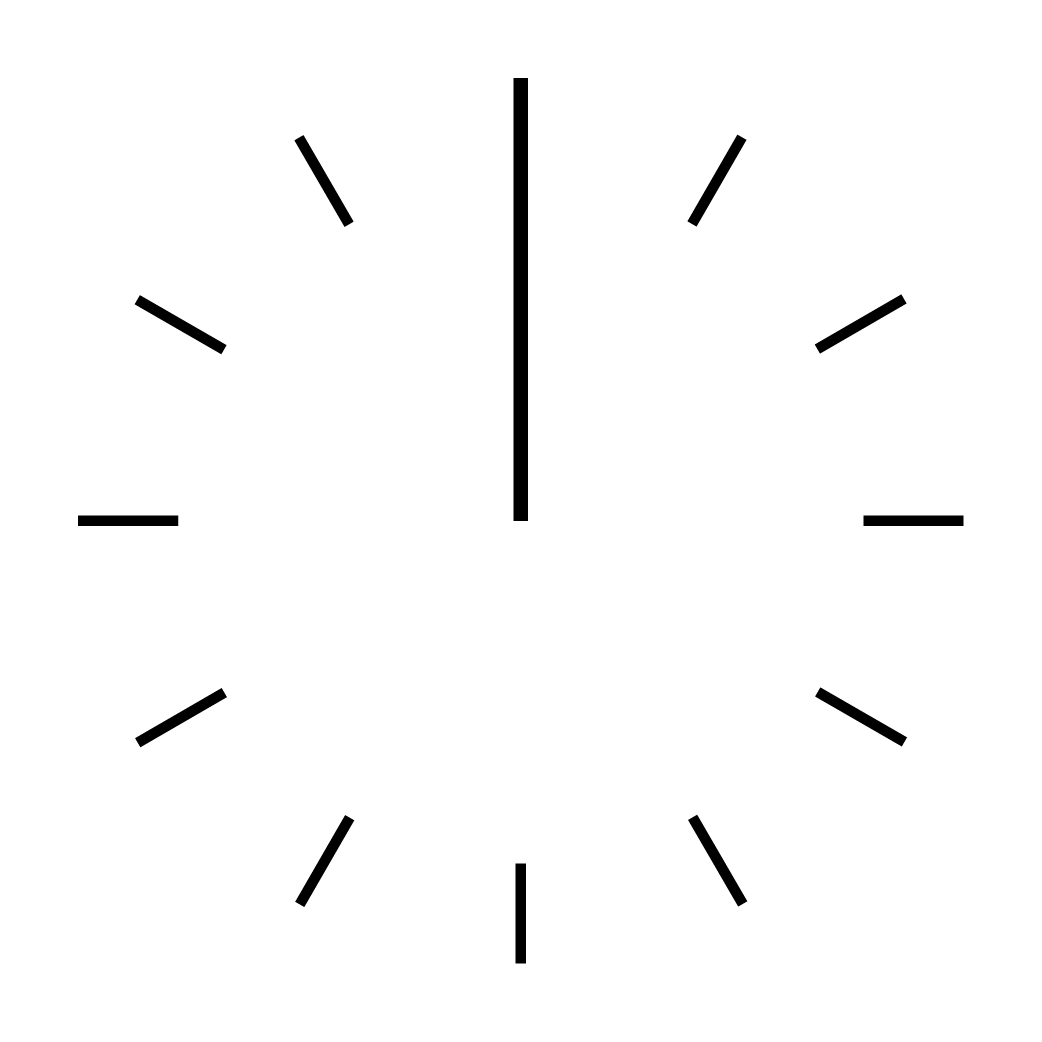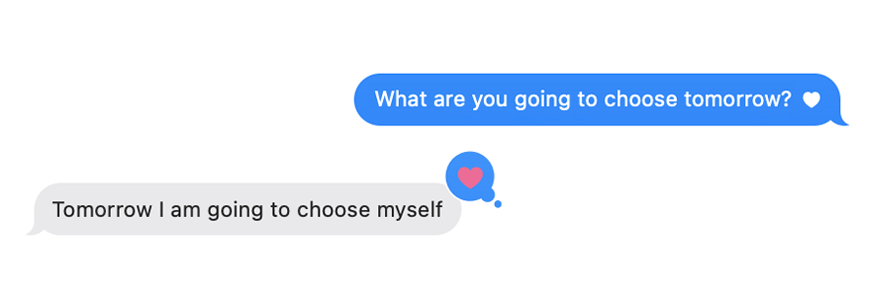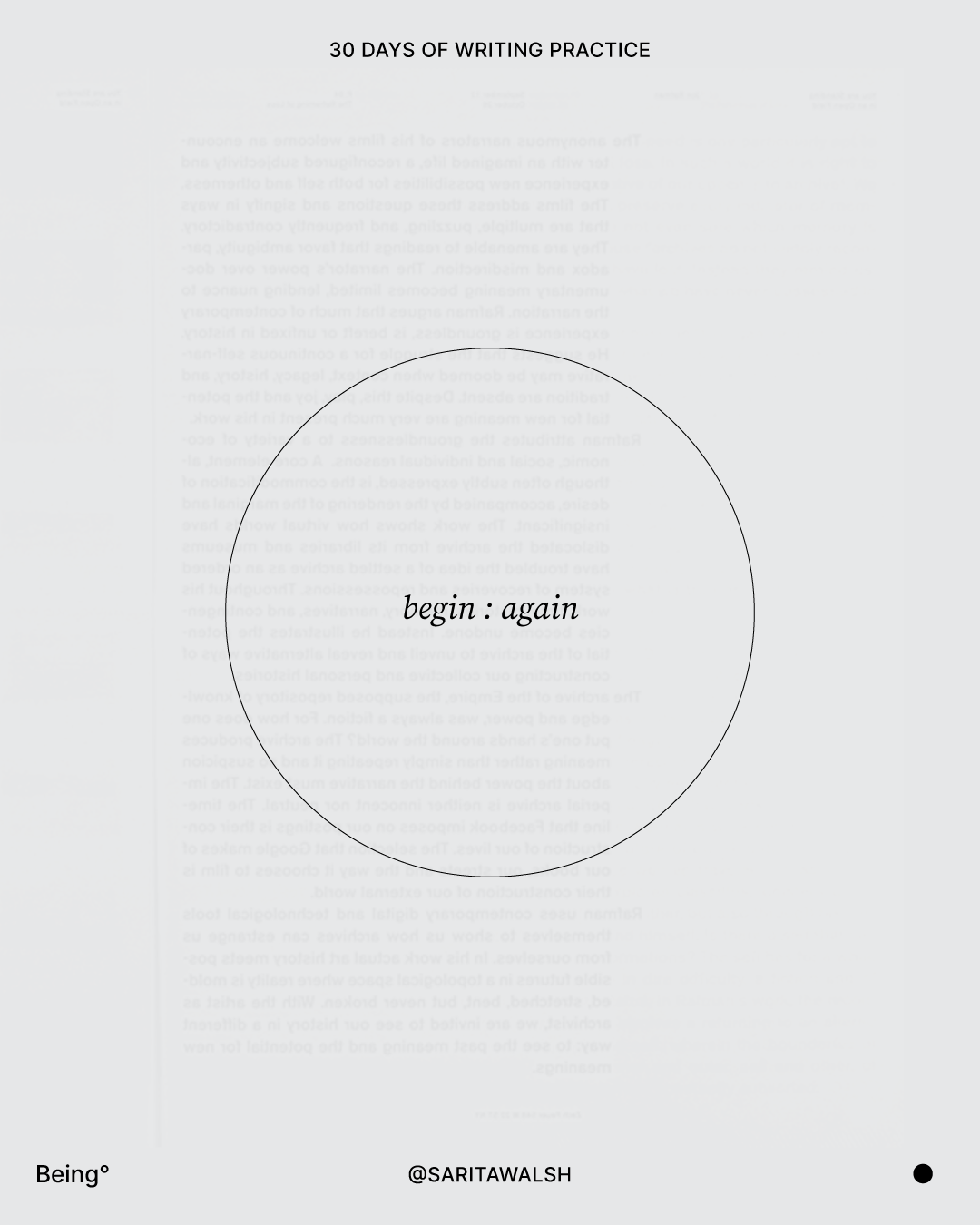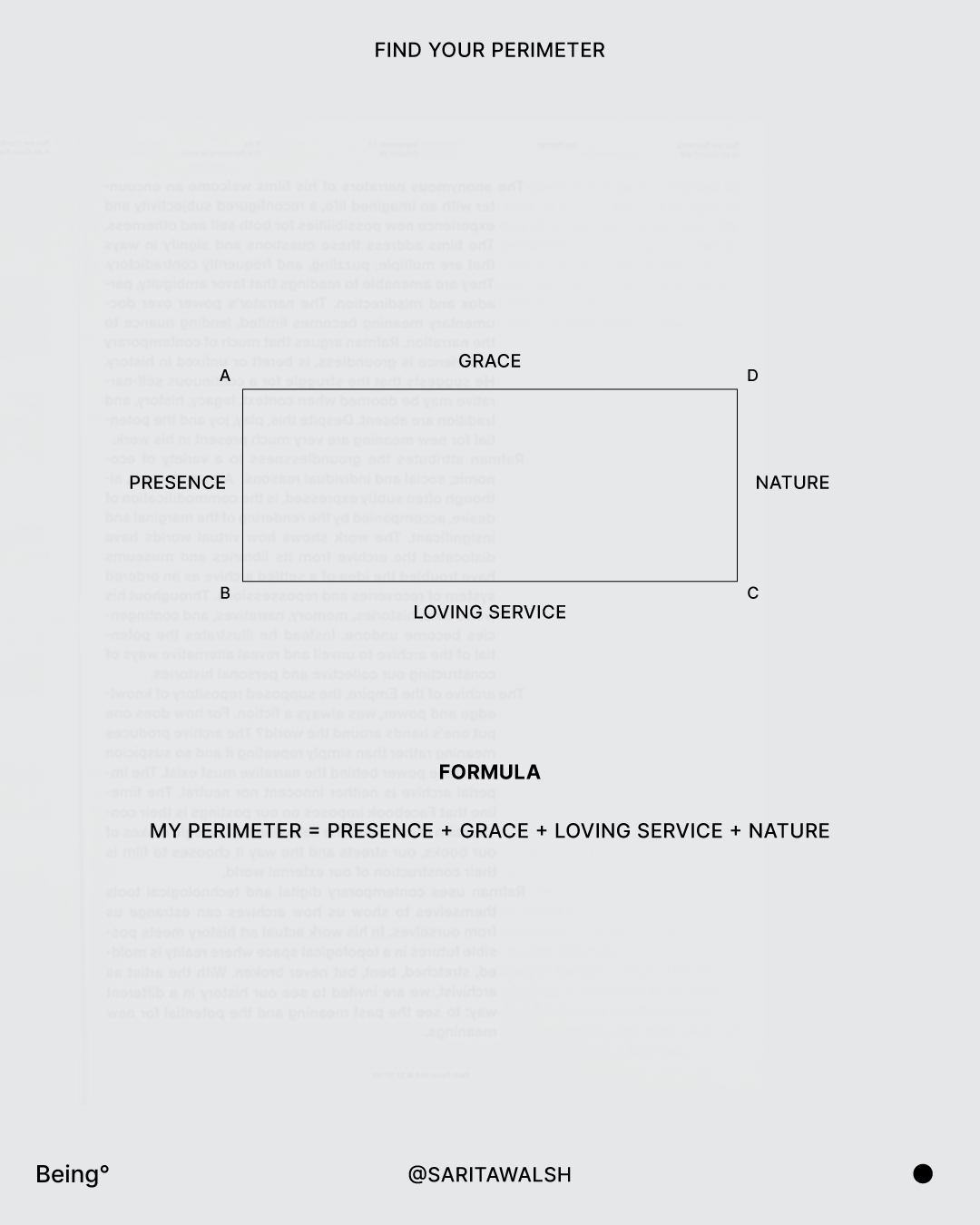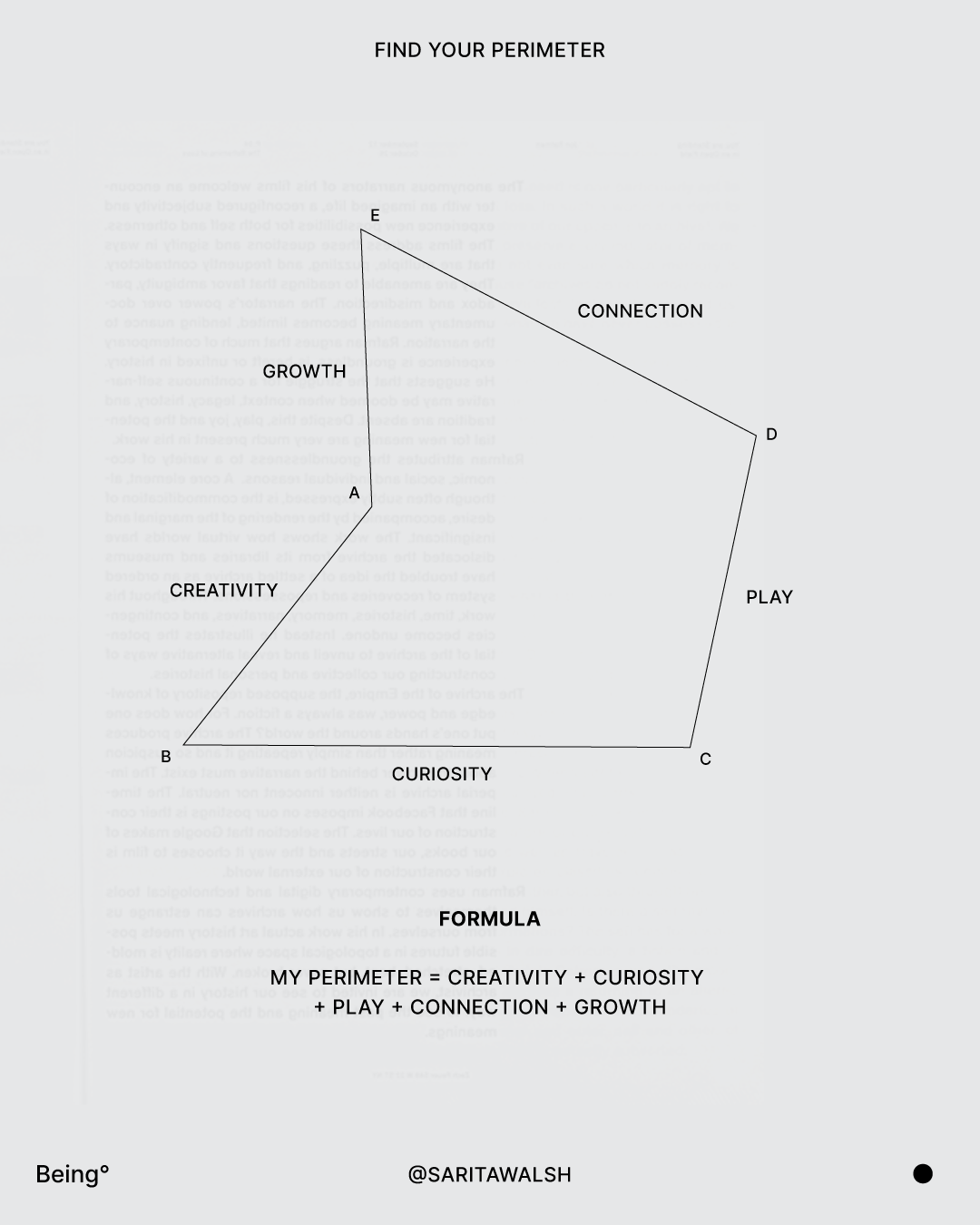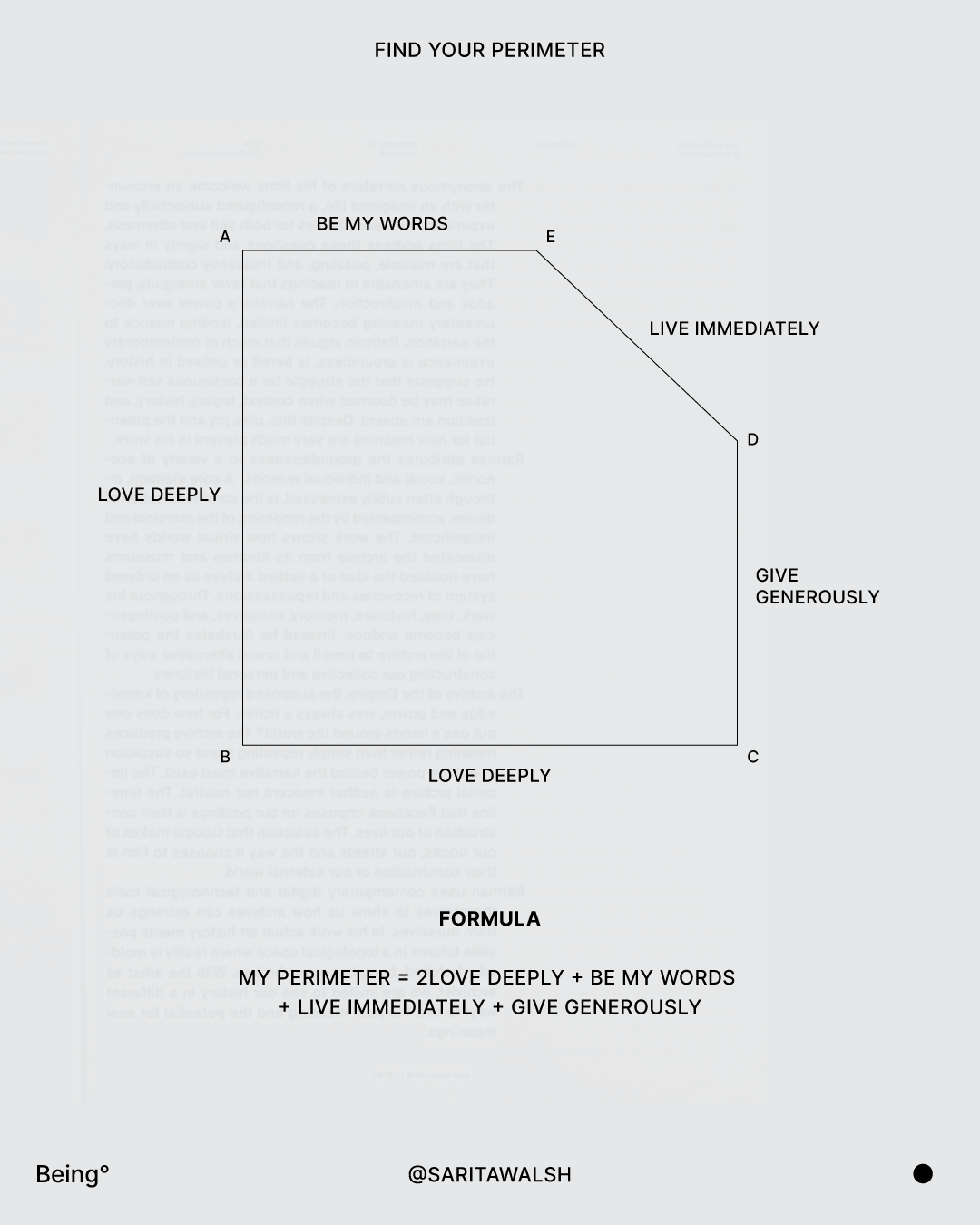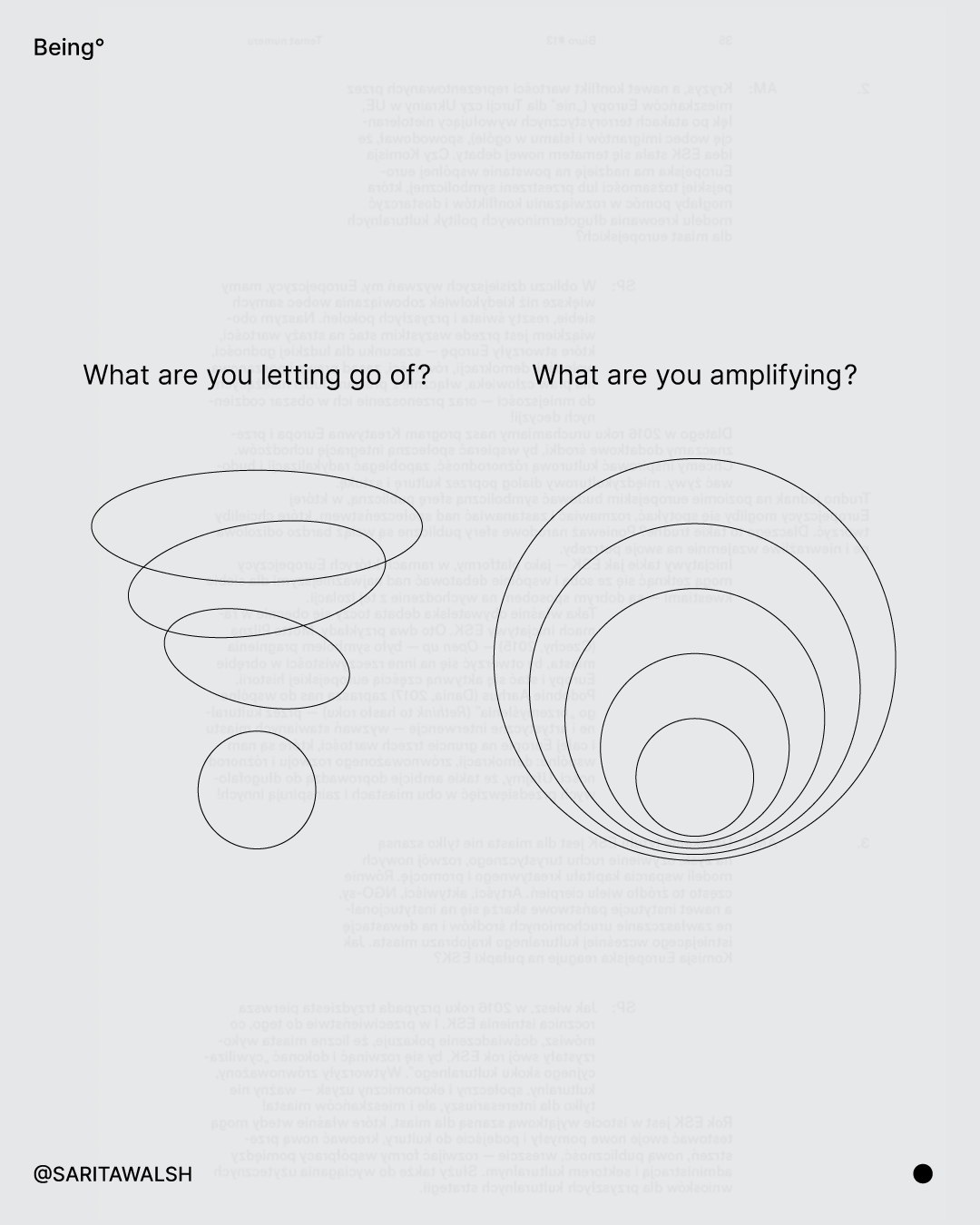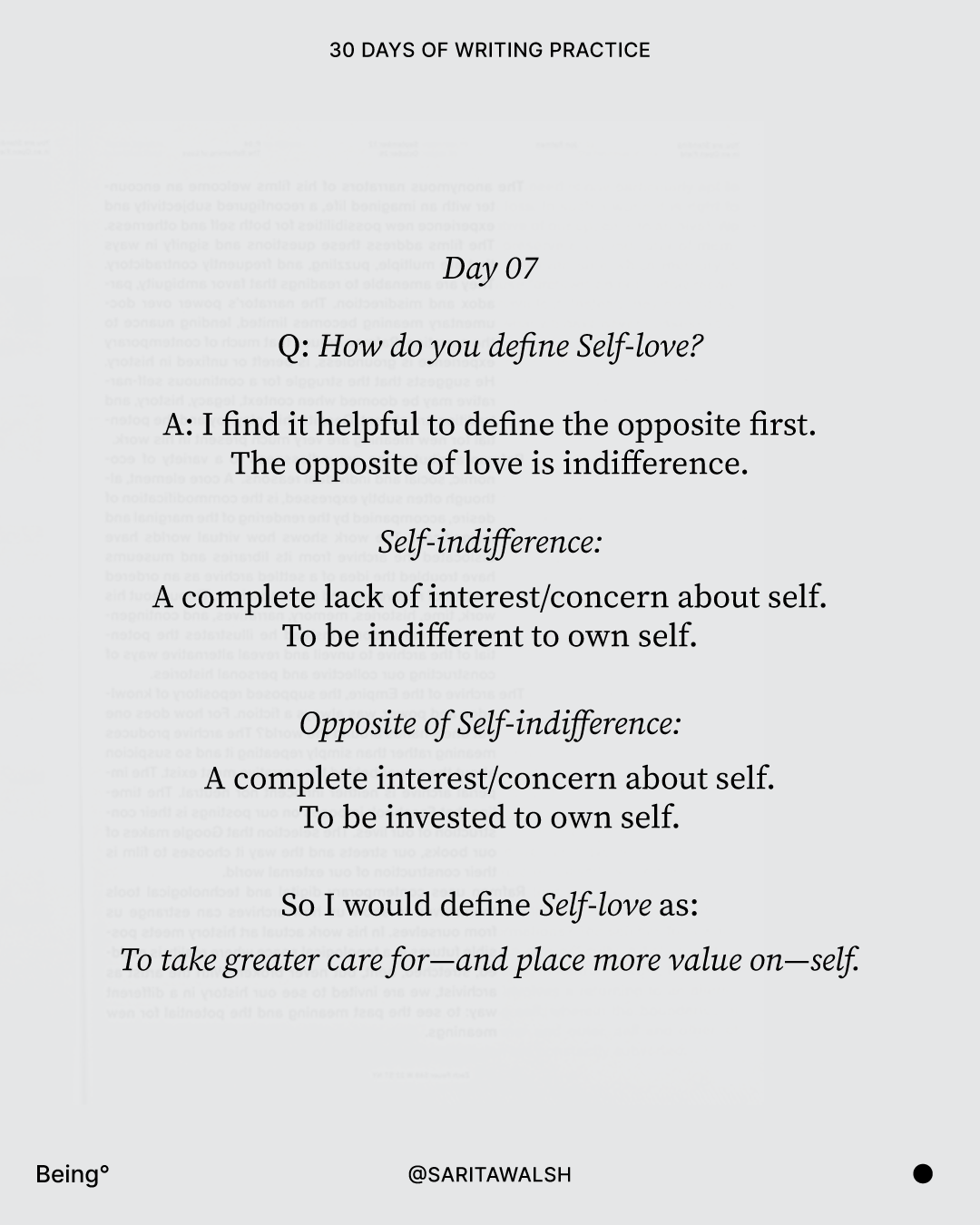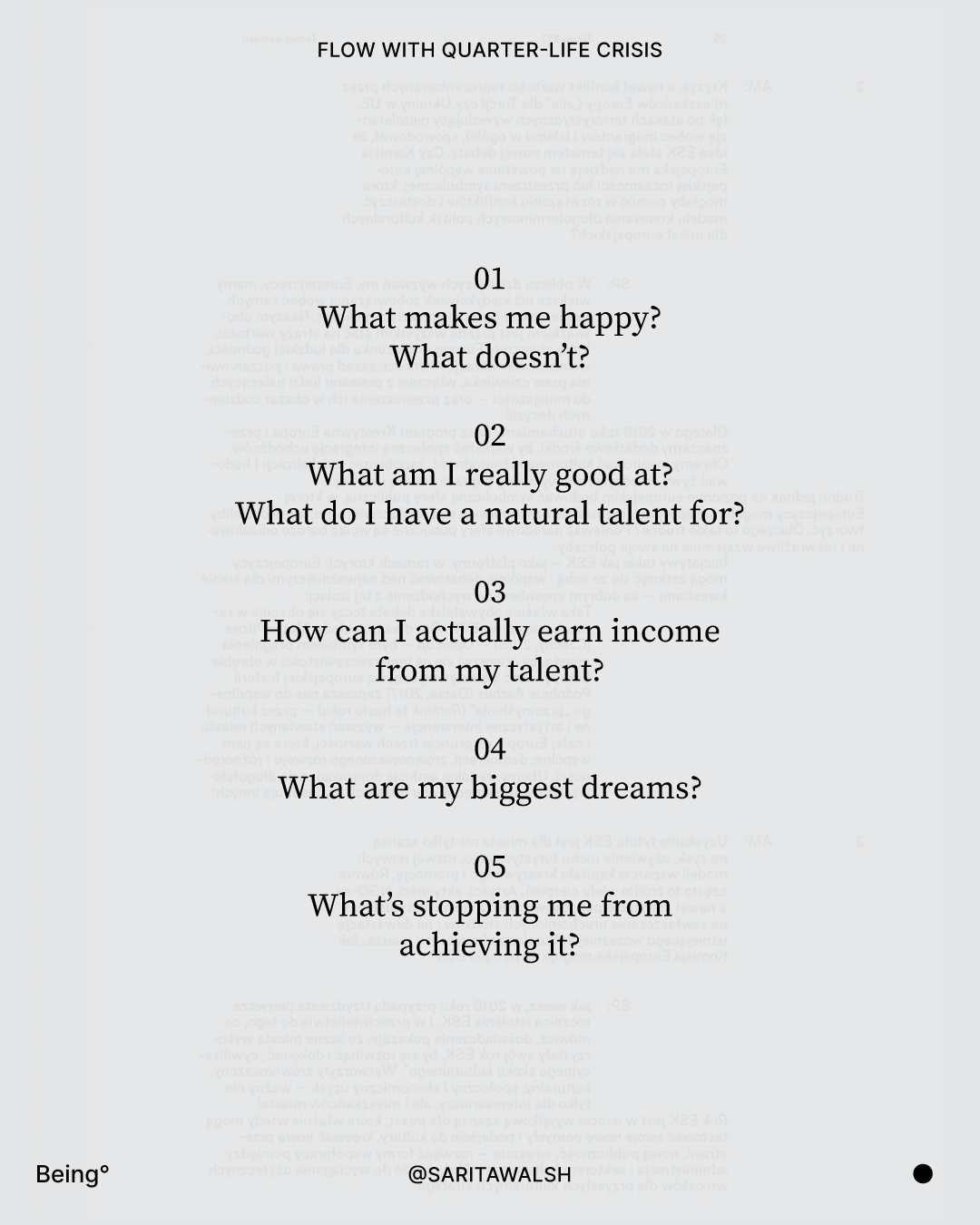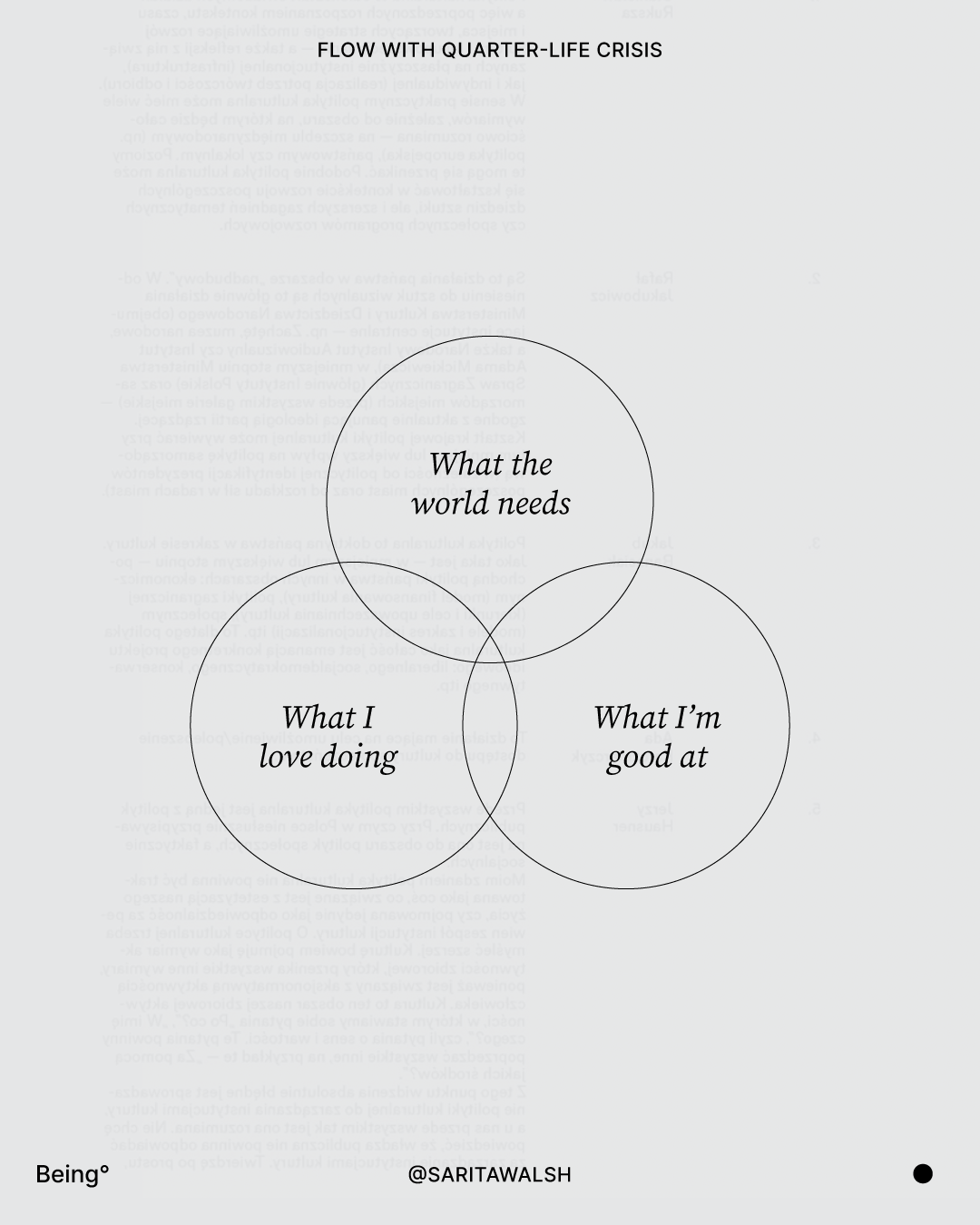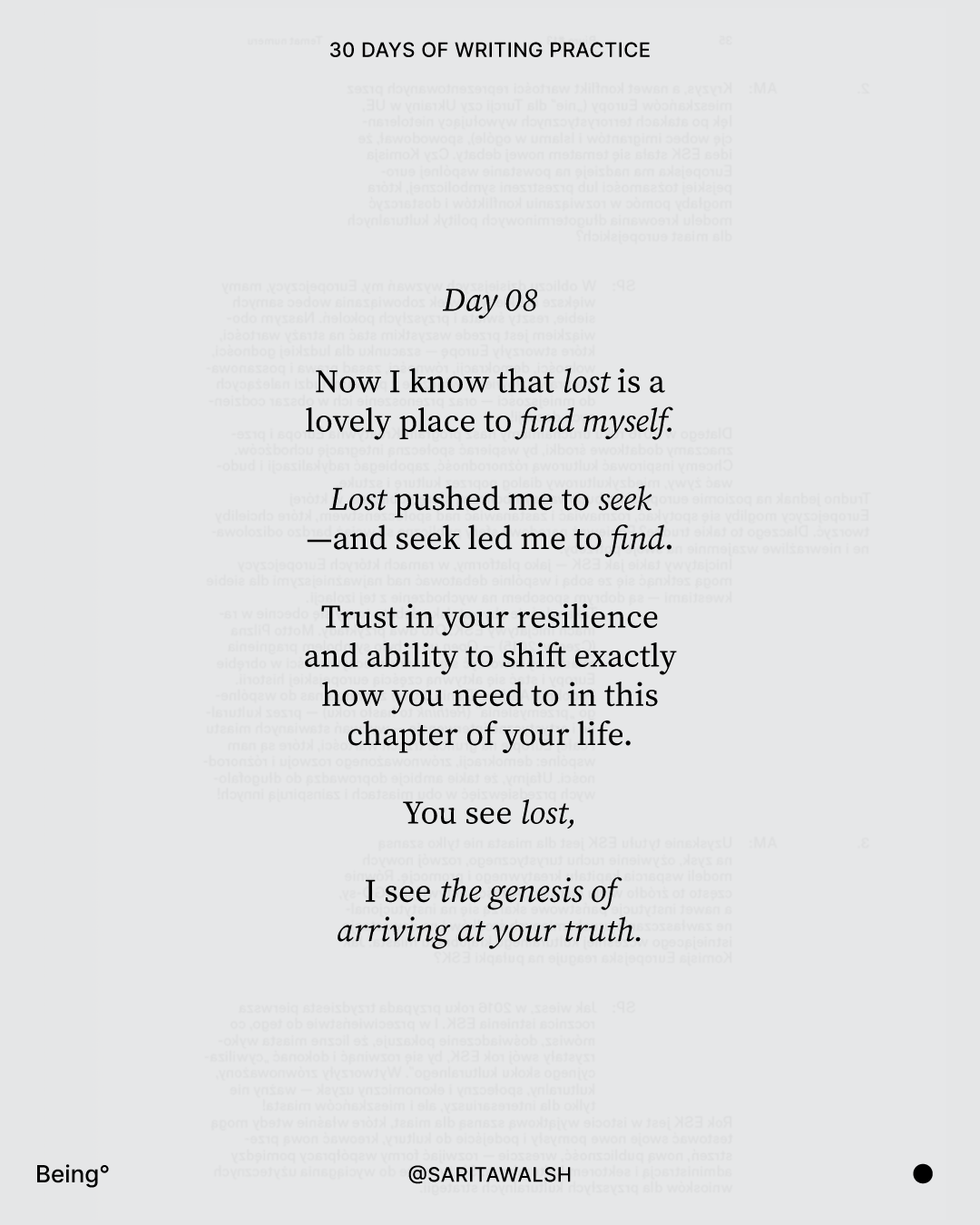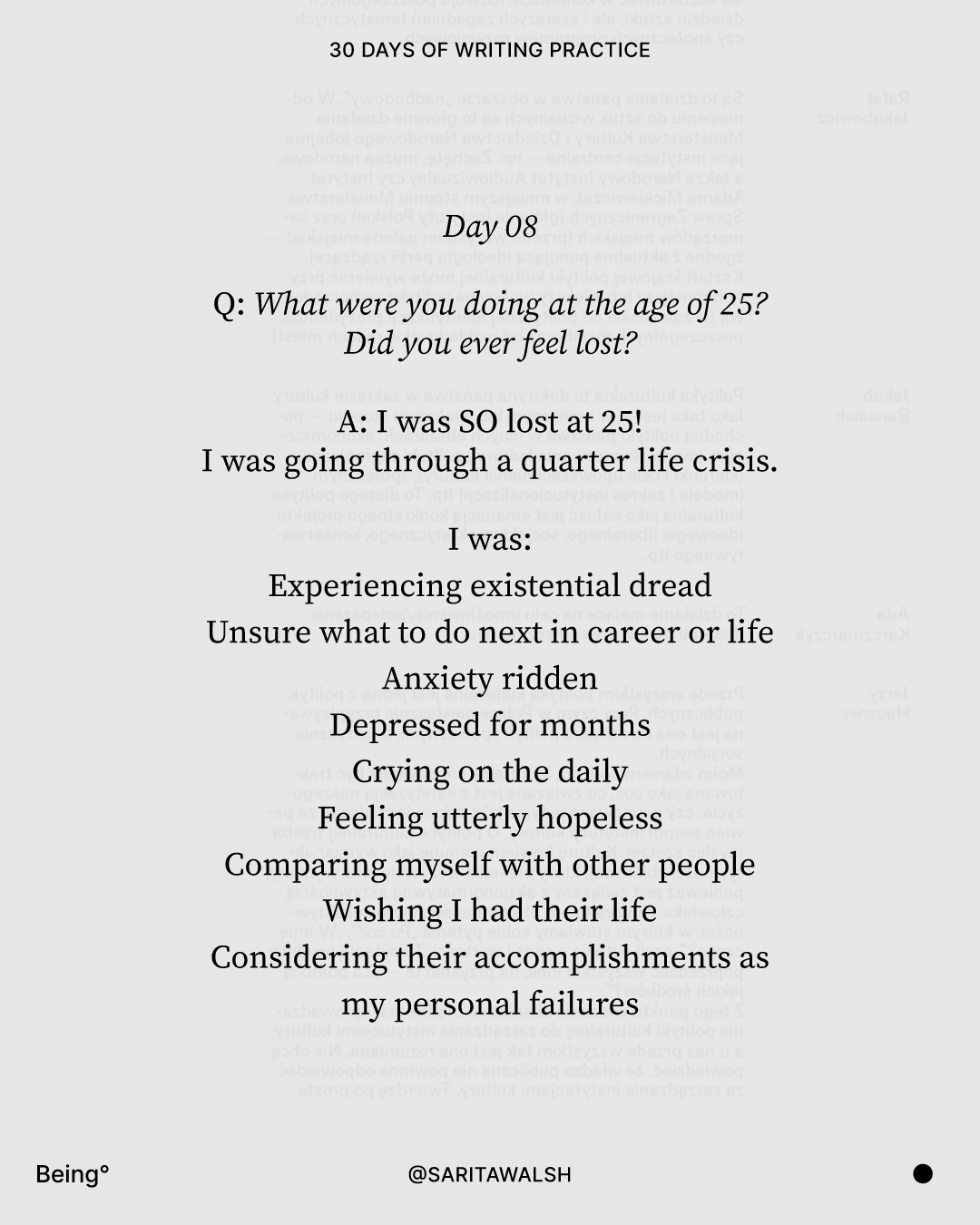The 2024 Beingº desktop design is inspired by the beauty and tranquility of a Zen garden. Rooted in Zen Buddhism, these gardens are aesthetically stunning while also imparting meaningful inspiration for our ways of being in the world.
Read moreI choose myself
🕑 4 minute read
Conversation → Clarity is a series of coaching conversation insights I had with my inspiring clients.
Context:
My former client, L, sent me a text.
I wrote back and shared with her a brilliant article by Seth Godin, along with 2 questions for her to answer.
Her response is what inspired me to create and share this writing with you. I love being inspired by my clients.
Enjoy!
Conversation:
The article:
Project resistance
In Steven Pressfield’s classic The War of Art, he introduces the idea of Resistance. It’s the internal force that keeps us from doing our most important creative work.
If an instinct, a habit or a feeling gets in the way of the work, it’s Pressfield’s Resistance. Things we would never choose to add to the flow of our days, but there they are.
It’s easy to imagine that Resistance is for screenwriters or novelists. Writer’s block and procrastination. But anyone leading a project of any kind–a business, a non-profit, a campaign–confronts it as well.
We could do something, we might do something, but we don’t. And so the work doesn’t ship, or it doesn’t meet its potential.
I’m not alone in facing Resistance. It happens everywhere we look.
Some of the symptoms of Resistance seem contradictory, but if we go back to the definition, that makes sense. Here are a few:
Procrastinating
Ignoring or avoiding the useful metrics
Focusing on vivid but non-useful metrics
Not shipping the project
Shipping junk
Asserting that it’s not Resistance
Being too busy to get to the hard part
Aiming too high
Aiming too low
Refusing to set a budget or deadlines
The tension of “this might not work” ends up feeling like stress instead
Not actively managing the project, letting the project manage us instead
Embracing sunk costs
Not asking useful questions
Refusing to find and use leverage or tools, focusing on the known fussy tasks instead
Blaming the system for our obstacles
Ignoring the system and acting as if we’re the first ones here
Being obsessed with new technology and opportunities, waiting for the next big thing
Refusing to learn about new tech or opportunities
Reacting instead of responding, responding instead of leading
Focusing on the urgent instead of the important
Obsessively documenting everything
Ennui
Irrational exuberance
Failing to delegate appropriate tasks
Taking too much credit
Ignoring useful feedback
Being reckless and assuming a net will appear
Looking for the shortcuts even when we know the long way is the only way
Sloppily leaving out details
Asking too many questions before making assertions
Our actual calendar of time spent doesn’t match the agenda for the work to be done
Making big promises we can’t keep
Refusing to make useful promises for fear of not keeping them
Taking it personally
Keeping our fears to ourselves
Using deadlines as fuel
Spending too much time focusing on our fear
Insisting on authenticity instead of consistency
Showing up late
Going over budget
Becoming a perfectionist
It’s tempting to imagine that Resistance is a moral failing, but it’s more like stubbing your toe or burning the toast. We don’t have to blame ourselves for where we are, but if we can see it and name it, we can learn to dance with it.
These behaviors may seem as though they happen to us, but ultimately, they’re a choice. A skill we can learn, a habit we can unlearn. We can be kind to ourselves, focus on the goal and get back to the project.
There are two confusions and one fear:
The first confusion is that we might not realize that these are choices.
The second confusion is that we might not have learned better tactics, tools and choices, but we can.
And the fear? It’s of change. The change of it might not work, or the chance that it will.
When Resistance arises, and it always does, we can see it, name it, and gently move on.
Her response:
L: “It was important for me to read this article because I was able to open my eyes and witness the truth that resistance can take so many forms, and it can happen to all of us, and—sorry, not happen—and that’s the answer for the second point because what is the most important thing I took from it is that resistance doesn’t happen to me. I choose resistance. It takes so many forms, but I choose. And if I’m able to choose it, I am able to choose something else.”
Clarity:
Questions:
1. Why is it important for YOU to read this exchange?
2. What is the most important thing YOU took away from this exchange?
3. What is ONE inspired action you are going to take with that insight?
High-Quality Questions
High-quality questions serve as the catalyst for meaningful discoveries—they encourage critical thinking, foster deeper understanding, and prompt insightful responses. They not only lead to more informed decisions but also promote effective communication, helping us explore complex issues, innovate, and make informed choices, ultimately leading to more productive and enriching experiences.
Read moreSelf first is not selfish
🕑 1 minute read
Conversation → Clarity is a series of coaching conversation insights I had with my inspiring clients.
Context:
E is currently participating in my advanced group coaching programme—Being° the Leader.
She is dedicated to being a source of loving support and empowerment for herself and others. Her goals include expanding her personal growth and creating a fulfilling life.
One of her objectives is to create magical team experiences by experimenting with facilitating powerful workshops on leadership and strengths.
She has just finished testing her first workshop inside the programme, and is currently experimenting with her second one. This time, she is receiving compensation for her efforts.
Below is her sharing her insights with me.
Conversation:
E:
“Holy wow I am already learning so much through this experience and one may think it hasn’t even started 😮”
I was inspired by her insight and created a visual to represent why it’s important to fill our cup first:
Clarity:
The takeaway is that choosing self first is not selfish.
How committed are you?
🕑 6 minute read
Imagine this
You and I are in a conversation—and I say to you:
“Hey! I run this workshop called Being° Together, and the last one is happening this Saturday. The investment is $195 and 3 hours of your time.
This workshop will open up new possibilities, bring clarity, inspiration, and help you take meaningful action in your life.
If you are committed to joining and be fully present, I promise you will experience a breakthrough that will profoundly impact your life.”
Be as honest as you can
What do you notice?
What’s going through your mind?
How would you respond to my invitation?
Did any of these come up?
"I don't have the time."
"I already have plans."
"I can't afford it."
"It's not my thing."
"I'm too tired."
"I'm not feeling well."
"I'm too busy with other commitments."
"I'm not comfortable in social situations."
"I don't know anyone there."
"I've been to similar events before."
Now, imagine this
Turns out I’m a billionaire and I say to you:
“If you attend the workshop this Saturday, you will get $100,000!”
Be as honest as you can
What do you notice this time?
What’s going through your mind?
How would you respond to my invitation?
Take a moment to reflect
What do you notice emerging once the $100K prize is guaranteed upon attending the workshop?
Did you experience this phenomena?
"I don't have the time."
"I’ll make it work.""I already have plans."
"I’ll move the plans.""I can't afford it."
"I’ll borrow money.""It's not my thing."
"Money is always my thing.""I'm too tired."
"I'm never too tired for $100K.""I'm not feeling well."
"I'm sure I’ll feel better by this Saturday""I'm too busy with other commitments."
"I'll move my other commitments.""I'm not comfortable in social situations."
"I'll deal with the discomfort.""I don't know anyone there."
"I’ll survive.""I've been to similar events before." "
I’m sure this is different."
You may observe a heightened level of creativity as you strategise and explore innovative ways to ensure your presence at the workshop.
Reward drives human behaviour and actions
When the desired outcome is assured—such as a $100,000 prize—it tends to have a profound impact on our commitment and creativity. It motivates us to fully dedicate ourselves to the task at hand.
We become more invested in achieving the goal
We are willing to put in the necessary effort and persistence
Our minds open up to new possibilities and innovative approaches
We’re empowered to embrace a mindset of exploration, problem-solving, and risk-taking
It fuels our imagination, propels us to explore uncharted territories, and encourages us to tap into our creative potential
We start thinking outside the box, exploring unconventional strategies, and pushing our boundaries to reach the objective in the most efficient and effective way possible
Imagine making a commitment to yourself and your life with the same level of dedication and enthusiasm as if you were guaranteed to receive $100K.
By embracing this mindset, you infuse your actions with a sense of purpose, empowering you to align your daily choices with your long-term vision.
Just as you would strive to maximise your chances of attaining the $100,000 reward—you would approach your personal and professional endeavours with unwavering commitment.
You would be driven to explore new possibilities, step outside of your comfort zone, and unleash your creative potential to achieve extraordinary results.
Your commitment would fuel your resilience and propel you forward—knowing that the ultimate payoff is worth the effort
Moreover, adopting this mentality fosters self-belief and self-confidence. It reminds you of your inherent worth and potential—encouraging you to take risks, learn from failures, and continuously grow and evolve.
By committing to yourself and your life as if you were guaranteed $100K, you unlock a new level of dedication and motivation. You become the architect of your own success—creating a life that is truly fulfilling and meaningful.
So imagine this again
You and I are in a conversation—and I say to you:
“Hey! I run this workshop called Being° Together, and the last one is happening this Saturday. The investment is $195 and 3 hours of your time.
This workshop will open up new possibilities, bring clarity, inspiration, and help you take meaningful action in your life.
If you are committed to joining and be fully present, I promise you will experience a breakthrough that will profoundly impact your life.
Wanna join?”
Wherever you go, there you are
🕑 1 minute read
Conversation → Clarity is a series of coaching conversation insights I had with my inspiring clients.
Context:
My client (let’s call her A) quit her job and moved from NYC back to Athens to prioritise what’s important to her—her family.
Conversation:
A:
“You know, NYC is really magical for me—and I am committed to making Athens more magical.
I don’t believe it, yet, and I’m working on it.”
Me:
“If two chefs cooked you a dish each, and they both are beyond delicious!
And I told you that one chef had a Premium Japanese A5 Wagyu Beef to work with, while the other had a local liver and kidney—which chef would you be impressed with?”
A:
“The one with the liver.
Funny you said liver, my brother cooked at an open fire the other day and it was goat liver with just olive oil and salt. It was amazing.
I guess love was another ingredient, too.”
Clarity:
Of course, judging the skill of a chef based solely on the ingredients they have to work with would be an oversimplification.
AND a great cook can create culinary magic regardless of the ingredients at their disposal.
BE that chef in your own life, and it won’t matter whether you’re in NYC or Athens.
The power to create magic resides within you. So, nurture your skills, cultivate a growth mindset, and let your creativity flourish.
Create space for self-improvement, and watch as your life transforms into a canvas where you paint your own masterpiece of magic and fulfillment.
Wherever you go, there you are.
So I "failed"
🕑 4 minute read
Storytime:
Back in January, I was looking for ways to be a better thinker.
My partner—who happens to be a best-selling author and an incredible thinker—said to me:
“If you want to think more clearly, write.”
Being the spontaneous multi-passionate creative force that I am, I—with little delay—committed to a 30-day challenge called ‘30 days of writing’ (a derivative from my previous ‘30 days of being’ project).
I announced this to my community on IG to create accountability for myself, and off I go being in action.
I never finished the challenge.
I stopped writing at day 9—and below are the insights I gained from the experience.
What I noticed:
Being in action—without overthinking—allowed me to quickly find that writing 30 short-form pieces doesn’t provide me the desired support.
I noticed that the brevity of the format led me to spend more time contemplating what to write, than actually writing.
Additionally, sharing my work with the community on Instagram created unnecessary pressure and effort in the process.
The focus on meeting the daily writing challenge became a distraction from the goal of consistently showing up and writing.
To establish a daily writing routine, the process in which I create must be simple and easy.
Most significantly, I realised I wanted to think more critically rather than solely expressing my thoughts clearly. This realisation created a shift in my writing approach and goals.
Did I know most of these insights prior to this experience?
Yes.
And knowledge is only a rumor until it is in the muscle.
The quality of my ‘knowing’ before this experience is not the same as the one I, now, have in my being.
What I did instead:
Instead of persisting with the 30-day challenge, I called it off and focused on writing about the insights I gained.
I dedicated 10 minutes to private writing for 30 days. This allowed me to focus on my thoughts without the pressure of sharing them immediately.
I said YES to podcast interviews to stimulate my critical thinking in a different format.
I actively engaged in rich dialogues with highly intelligent people to broaden my perspectives.
These alternative actions reflect a shift in my approach, prioritising personal growth, deeper reflections, and meaningful interactions over the previous writing challenge format.
So did I fail?
My previous self would have nodded aggressively and said:
“Yes, this is failure.”
My current self, though, would smile and say:
“This is feedback!”
I, now, know the importance of viewing setbacks and mistakes as valuable opportunities for learning and growth.
Instead of perceiving a situation as a failure, seeing it as feedback allows me to extract valuable lessons, make adjustments, and move forward with improved understanding and insight.
This perspective encourages me to embody resilience, adaptability, and a positive attitude towards challenges—fostering my personal and professional development.
My biggest takeaway:
Action creates clarity that goes beyond mere information—and encompasses a deeper understanding of the world and oneself.
The ‘30 days of writing' project
🕑 5 minute read
One of my 2023 commitments is to communicate clearly—and in order to communicate clearly, one must think clearly. Since writing is thinking in practice, I decided to:
Bring back The ‘30 days of being' project
Commit to writing every day for 30 days starting today
Celebrate on January 31, 2023
Transformation occurs with tiny, tiny steps. In this case, 30 tiny steps.
Inspired to join me?
The rules are simple:
Choose to create something that is meaningful to your long-term purpose in life
Make it simple and repeatable
Create consistently every day for 30 days
Aim for progress—not perfection
Use the ‘Yes’ or ‘No’ approach to track your progress
Have you done the thing or not? Yes or No?
If you need accountability—share your 30-day commitment with your community
I’ll be sharing my writing below, as well as instagram. Use the #30daysofbeing so I could see what you’re creating.
My ‘30 days of writing' practice
Day 01 — 01.01.23
Random thoughts during yoga practice
When we practice living everyday like a new beginning, new year doesn’t feel as precious.
There is less pressure—and expectation—to perform, because we know we have tomorrow to begin again.
365 (days) opportunities.
31,536,000 (seconds) chances to start over.
It’s liberating to know we have a choice—and that we can always choose to begin again,
and again,
and again,
and again,
in the infinite moment of now.
Day 02 — 01.02.23
There is value in knowing what not to do.
In experimenting and going just a little too far to see where the edges are—so we know the perimeter of our desired experience.
To walk—and fall,
bike—and crash,
write—and misspell,
bake—and burn,
drink—and be drunk.
Give yourself a break, embrace ‘mistakes’.
It’s through these ‘mistakes’ that we gain the wisdom of experience and clarity through contrast.
They are invitations for us to practice beginning again gracefully, and trusting in our ability to redirect—not repeat.
Day 03 — 01.03.23
The beauty of impermanence.
Last year I heard a beautiful question:
“What do I need to know about you in order to understand you?”
My answer:
“That growing up, I felt worthless, inferior, fundamentally flawed and deeply alone.
That today, the love I have for myself and others could drown oceans.”
Day 04 — 01.04.23
Use your imagination—not your past—to create your future.
Day 05 — 01.05.23
One of the best decisions I’ve ever made was not avoiding a relationship while I’m working on myself.
The right person will give you the space, presence, love, respect and support.
You do not need solitude to grow.
Keep yourself open for joy.
Day 06 — 01.06.23
Q: What's the hardest part about starting?
A: Crossing your mental barrier of potentially facing disappointment, because your expectations—or your taste—are far more refined than your first-attempt could ever live up to.
Day 07 — 01.07.23
Q: How do you define Self-love?
A: I find it helpful to define the opposite first.
The opposite of love is indifference.
Self-indifference:
A complete lack of interest/concern about self.
To be indifferent to own self.
Opposite of Self-indifference:
A complete interest/concern about self.
To be invested to own self.
So I would define Self-love as: To take greater care for—and place more value on—self.
Day 08 — 01.08.23
Q: What were you doing at the age of 25? Did you ever feel lost?
A: I was SO lost at 25! I was going through a quarter life crisis.
I was:
Experiencing existential dread
Unsure what to do next in career or life
Anxiety ridden
Depressed for months
Crying on the daily
Feeling utterly hopeless
Comparing myself with other people
Wishing I had their life
Considering their accomplishments as my personal failures
Now I know that lost is a lovely place to find myself.
Lost pushed me to seek—and seek led me to find.
Trust in your resilience and ability to shift exactly how you need to in this chapter of your life.
You see lost.
I see the genesis of arriving at your truth.
Day 09 — 01.09.23
Self love is knowing how to choose yourself before anyone else.
I did not finish this ‘30 days of writing’ project—and here is a piece I wrote about my experience and insights.
The ‘30 days of being' project
Have you ever felt so creatively inspired you thought to yourself "I want to share more of myself, and my creation, with the world!"?—and then you started listening to your low-quality thoughts that talk you out of sharing because, well...
Read more2021 Mac + Windows Desktop Backgrounds + 24 Custom Icons
2021 Mac Desktop Backgrounds + 24 Custom Mac Icons + Bundle.
Read more